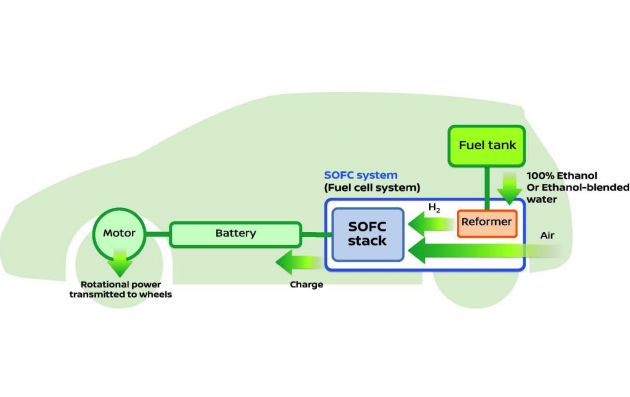Nissan has announced it is currently developing the world’s first solid oxygen fuel-cell that runs on bio-fuel.
 The solid oxygen fuel-cell (SOFC) system, a first for the automotive sector, is, according to the engineers at Nissan, “a fuel cell utilising the reaction of multiple fuels… with oxygen to produce electricity with high efficiency”.
The solid oxygen fuel-cell (SOFC) system, a first for the automotive sector, is, according to the engineers at Nissan, “a fuel cell utilising the reaction of multiple fuels… with oxygen to produce electricity with high efficiency”.
It’s a fuel-cell that instead of running on hydrogen, for the first time, utilises the combination of bio-fuel and oxygen.
The e-Bio fuel-cell’s SOFC creates electricity by adding bio-ethanol stored on board, but can also run on natural gas. It then utilises the hydrogen created from fuel with something called a reformer, and the oxygen in our atmosphere. Look, we don’t understand it either, but Nissan says the end result is more than enough electricity to power a vehicle.
The e-Bio fuel-cell has a claimed range of more than 600km, and benefits from things like a silent ride, and drivers can experience instantaneous torque that EVs are famed for.
Nissan is keen to point out that its SOFC system is a fuel system that causes biofuels to react with a noble gas-like oxygen, with no hazardous by-product released into the atmosphere. When power is generated, carbon dioxide is produced, but can be seen as a carbon-neutral cycle thanks to the growing process of sugarcane and corn, which make up bio-fuels.
Nissan is billing the e-Bio fuel-cell as an accessible means of powering vehicles, and adds that ethanol-blended water is safer to handle than conventional fuels. It also eliminates the need to install a vast new system for fuelling or maintenance infrastructure, specifically for SOFC vehicles.
Expect to see a concept previewing Nissan’s SOFC technologies at an upcoming international motor show.
